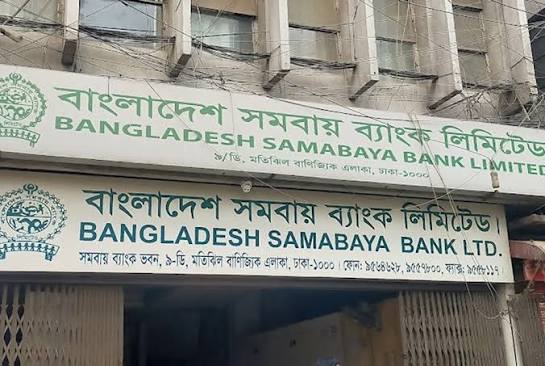Mousumi Islam
Published:2025-11-13 19:03:01 BdST
Govt plans legal reforms to revive struggling Samabaya Bank
Thousands of bhori of gold stolen from its vault, massive defaulted loans, acute manpower shortages, and capital deficits – the Bangladesh Samabaya Bank is struggling to survive amid a host of financial and operational crises.
The government now plans to revive the bank through a set of proposed legal amendments.
Until now, Samabaya Bank could only lend to cooperative society members and organisations. However, under the proposed amendment, the bank will no longer be restricted to the cooperative sector, allowing anyone to take loans.
A special meeting held at the Department of Cooperatives on 6 October approved several proposals for legal amendments. The meeting emphasised not only reforming the Samabaya Bank but also modernising and updating various sections of the Cooperative Act.
According to the draft amendment, “Bangladesh Samabaya Bank Limited shall be a bank registered under this Act, whose main objective shall be to form funds for lending to cooperative societies, cooperative-related persons or organisations, and any other persons or organisations.”
This provision effectively opens up the bank’s lending activities to the general public.
Previously, under special instructions from Bangladesh Bank, individuals could open and deposit accounts in the Samabaya Bank, but they were not eligible for loans.
As a result, the bank failed to attract depositors since it functioned only as a depository institution.
The proposed amendment also seeks to revise Section 3 of the Cooperative Act, altering the capital reserve policy.
Currently, each cooperative society must deposit at least 15% of its net annual profit as a reserve fund, which can be held with any scheduled or designated bank.
The new amendment adds “the Cooperative (Samabaya) Bank” as one of the eligible institutions for these reserve deposits.
Financial condition of the bank
Founded in 1972 to provide easy loans to small and medium farmers, the Bangladesh National Samabaya Bank Limited now operates only in name, crippled by decades of corruption, irregularities, and mismanagement.
A special audit by the Department of Cooperatives reveals that the bank currently has 397 members, with members’ savings totaling only Tk1 lakh.
Other deposits stand at Tk7.17 crore, while savings fund liabilities amount to nearly Tk200 crore. Retained earnings debt stands at Tk6.43 crore, and government loan debt at Tk50 crore. The bank’s total loan liabilities, including interest, amount to Tk89 crore.
Currently, the bank is surviving mainly on profits from fixed deposits (FDRs) placed in other banks.
Although total deposits stand at Tk5,607 crore, operations have nearly become stagnant due to a severe manpower shortage and the absence of an elected management committee.
No such committee has been formed in the past 10 years, despite the Cooperative Act mandating it. Out of 332 approved positions, only 218 are currently filled, leaving 114 vacant.
In 2021, over 11,000 bhori (about 130 kg) of gold, valued at more than Tk40 crore, were stolen from the bank’s vault. The case remains unresolved, with neither recovery of the gold nor justice delivered, severely damaging public trust in the institution.
Key changes in the Cooperative Act
The proposed amendments to the Cooperative Act include several significant revisions and additions.
The Section 18 says, for cooperatives where the government holds ownership in paid-up share capital, has provided loans, or guaranteed loans, the Registrar shall appoint one-third of the management committee members within 15 days of the election or before the existing committee’s term expires.
The previous rule applied only when the government held more than 50% ownership or provided over 50% of total loans, allowing 60 days for appointments.
In the election provisions, a new clause authorises the Registrar to extend, postpone, or cancel election dates and to form interim committees if irregularities or complaints arise.
About the registration process, it states, upon receiving an application, the Registrar must collect necessary documents and conduct an investigation within 30 days. New memberships after registration will require prior approval from the Registrar.
The Section 15 asserts that each member must purchase at least one share at face value during registration. The proposed change adds that no individual other than the government may purchase more than one-twentieth of the cooperative’s approved share capital.
Besides, cooperative registration must be renewed every three years while the definition of “auditor” will be expanded to include institutions, not just individuals.
The amendments to Section 17 proposed that cooperatives must hold annual general meetings (AGMs) within 60 days after the completion of audits, extendable by another 60 days with Registrar approval. The amendment further specifies that AGMs must be held by 30 June each year.
If a cooperative fails to achieve quorum for two consecutive years, the Registrar may declare it defunct – previously, the limit was three years.
Munima Hafiz, registrar and director general (additional charge) of the Department of Cooperatives, said, “The Samabaya Bank is in a weak state. It used to be even worse. Through various reforms, the government is trying to make the bank active again. This will increase public participation.”
Humayun Khalid, former director general of the Department of Cooperatives, said, “The bank is struggling due to severe irregularities. The first priority should be recovering defaulted loans. The gold theft case must also be resolved and a corruption-free management structure ensured.”
Cooperative expert Emdad Hossain Malek added, “There is a serious lack of transparency and accountability in cooperative management. Irregularities and corruption go unchecked.”
“The bank hasn’t held an election in 10 years – how can it be managed properly? The government must ensure effective oversight through these legal changes; otherwise, millions in public deposits could be at risk,” he said.
Unauthorized use or reproduction of The Finance Today content for commercial purposes is strictly prohibited.


